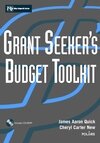Grant Seeker's Budget Toolkit
Are you writing your first proposal or project budget? The Grant Seeker's Budget Toolkit, written in clear, basic prose, is certain to make your job a little easier. Do you need advice on how to compute personnel costs or help on deciding what constitutes a direct or indirect cost? Unsure of how to write a budget narrative? This step-by-step guide to developing a budget is a practical reference tool for any novice development staff member.
The Grant Seeker's Budget Toolkit is part of the Wiley Nonprofit Law, Finance and Management series and the third in a series by co-authors James Aaron Quick and Cheryl Carter New. This husband-and-wife team are founders of Polaris, a South Carolina corporation. Both are instructional specialists and have developed courses on grantseeking, grant management, and proposal writing for nonprofit organizations. Companion books published by the same team in the Wiley nonprofit series include The Grant Seeker's Toolkit: A Comprehensive Guide to Finding Funding and The Grant Winner's Toolkit: Project Management and Evaluation.
The Grant Seeker's Budget Toolkit is divided into three main parts. Part One covers budget development, the alignment of the project, the problem (the delineation of the problem) and the eventual translation of this information into a budget. If you don't need a refresher on this process skip to Part Two "Developing Your Budgets." The focus here is on the fundamentals of project budgets, defining concepts and terms, such as "direct costs" or "in-kind" using examples drawn from federal, foundation, corporate, state, and local funders. Part Three concludes with "Reporting Your Budgets," which includes information on developing a finished budget, and the budget narrative. The book is helpfully illustrated throughout with charts and sample calculation worksheets.
The Grant Seeker's Budget Toolkit functions best as a reference tool used side-by-side with a budget worksheet in hand. An appendix or a discussion of computer tools such as Excel or Lotus worksheets would have been helpful. However, a CD-ROM with forms, spreadsheets, and checklists is included.
For citations to additional materials on this topic, refer to Literature of the Nonprofit Sector Online, using the subject heading "Proposal development-handbooks, manuals, etc."










